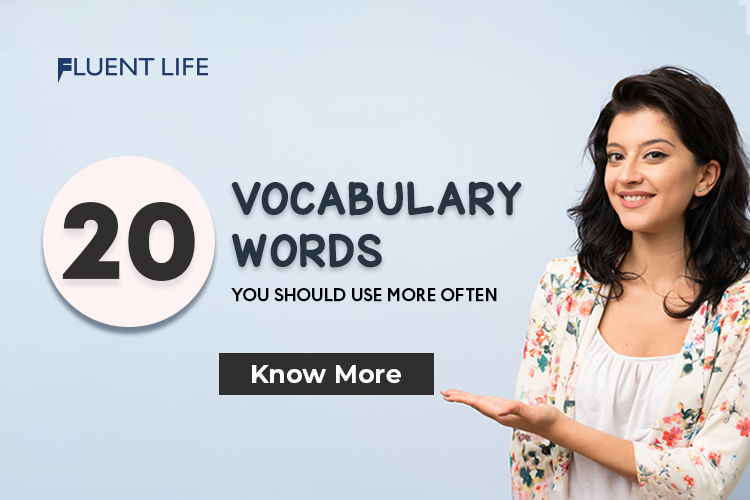Do you want to boost your English communication and writing? Do you want to learn new vocabulary words? Well, if yes, this article will provide you with vocabulary words in English so that you do not acknowledge the words but understand their meanings to use them in the sentences. Here is the impressive vocabulary for everyday use. So, let’s go ahead with the 20 vocabulary words you should use more often.
Also Read: Tips for Teachers to Improve Communication Skills: Let’s Grab the Information Here!
20 Vocabulary Words You Should Use More Often
Expanding your vocabulary can be a great way to improve your communication skills and sound more articulate. There are many words in the English language that are underused but can add depth and complexity to your speech and writing. Here are 20 vocabulary words that you should consider incorporating into your everyday conversations:
# Ineffable – too great or extreme to be expressed or described in words.
Example: The view from the mountaintop was ineffable, no picture or description can do it justice.
# Mellifluous – sweet-sounding; pleasing to the ear.
Example: The mellifluous sound of the orchestra filled the concert hall.
# Ephemeral – lasting for a very short time.
Example: The beauty of cherry blossoms is ephemeral, they only bloom for a couple of weeks each year.
# Serendipity – the occurrence and development of events by chance in a happy or beneficial way.
Example: Finding a rare book you’ve been searching for in a used bookstore is the ultimate serendipity.
# Resilient – able to withstand or recover quickly from difficult conditions.
Example: The people of New Orleans have shown themselves to be incredibly resilient in the aftermath of Hurricane Katrina.
# Ubiquitous – present, appearing, or found everywhere.
Example: Smartphones have become ubiquitous in modern society.
# Magnanimous – generous or forgiving, especially towards a rival or someone less powerful than oneself.
Example: After winning the championship, the team captain was magnanimous towards the opposing team and congratulated them on their effort.
# Eclectic – deriving ideas, style, or taste from a broad and diverse range of sources.
Example: The restaurant’s eclectic menu featured dishes from all over the world.
# Aesthetic – concerned with beauty or the appreciation of beauty.
Example: The designer’s aesthetic was clean and minimalist.
# Copious – abundant in supply or quantity.
Example: The author took copious notes during her research for the book.
# Superfluous – unnecessary, especially through being more than enough.
Example: The extra decorations were superfluous and only cluttered the room.
# Perfunctory – carried out with a minimum of effort or reflection.
Example: The student’s essay was perfunctory and lacked depth.
# Quixotic – exceedingly idealistic; unrealistic and impractical.
Example: His quixotic dreams of becoming a rock star were dashed when he couldn’t even play a basic chord.
# Pernicious – having a harmful effect, especially in a gradual or subtle way.
Example: The pernicious effects of pollution on our environment are becoming increasingly apparent.
# Tenacious – tending to keep a firm hold of something; clinging or adhering closely.
Example: The climber’s tenacious grip on the rock allowed him to make it to the summit.
# Sanguine – optimistic or positive, especially in an apparently bad or difficult situation.
Example: Despite the setbacks, she remained sanguine and believed that things would work out in the end.
# Nonplussed – surprised and confused so much that they are unsure how to react.
Example: The CEO was nonplussed when her proposal was rejected by the board.
# Nefarious – wicked or criminal.
Example: The villain’s nefarious plan was foiled by the hero.
# Equanimity – mental calmness, composure, and evenness of temper, especially in a difficult situation.
Example: The surgeon displayed equanimity during the high-pressure operation.
# Ameliorate – make (something bad or unsatisfactory) better.
Example: The company took steps to ameliorate the working conditions of its employees.
Also Read: Understanding What is Hyperbole with Examples for Better English Learning
Vocabulary Words in English
Vocabulary words play a crucial role in the English language. You should know the impressive vocabulary for everyday use. Here are some reasons why having a strong vocabulary is important:
# Effective Communication: The right choice of words can help convey our thoughts and ideas in a clear and concise manner. Having a wide range of vocabulary enables us to express ourselves more effectively and efficiently.
# Enhances Reading and Writing Skills: Having a good vocabulary is essential for reading comprehension and writing skills. A vast vocabulary helps in understanding complex texts, leading to improved reading comprehension. Additionally, when writing, a broader vocabulary can help to articulate thoughts and ideas better and make writing more engaging and interesting.
# Improves Cognitive Abilities: Building a strong vocabulary not only improves communication skills but also cognitive abilities. Learning new words helps to improve memory retention and recall, analytical skills, and critical thinking.
# Builds Confidence: Having an extensive vocabulary makes us feel more confident while speaking or writing. This confidence comes from the ability to express ourselves more eloquently and effectively, which can lead to better social interactions and more significant opportunities.
# Enhances Career Prospects: A strong vocabulary is essential for professional success, especially in fields like journalism, law, medicine, and academia. Employers seek candidates with good communication skills, and a broad vocabulary is an essential aspect of it.
Also Read: The Best App To Improve English Speaking Skills
Conclusion
In conclusion, a strong vocabulary is crucial for effective communication, improving reading and writing skills, cognitive development, building confidence, and enhancing career prospects. Regular practice and exposure to new words can help to improve vocabulary significantly, and it is a lifelong learning process. You must visit the Fluent Life website for more content.






